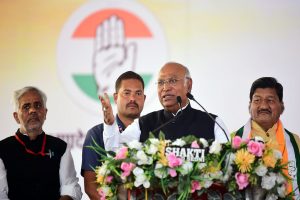The US has commented on Prime Minister Narendra Modi's demonetisation move, saying that while one of the purposes cited by him was to counter terrorist activity funded by counterfeit currency, India has yet to implement laws effectively on criminal convictions or take steps to ensure companies are adhering to anti-money laundering rules.
The US State Department, in its Country Reports on Terrorism, under the section Countering the Financing of Terrorism, says: "In November, Prime Minister Modi announced the demonetisation of 500 and 1,000 rupee currency notes and asserted that one purpose of this initiative was to curb terrorist activity funded by counterfeit notes, black money, and stockpiled cash reserves.
"Although the Government of India aligned its domestic anti-money laundering/countering the financing of terrorism (AML/CFT) laws with international standards by enacting amendments to the Prevention of Money Laundering Act in 2012, and in 2016 initiated a National Risk Assessment for anti-money laundering/countering the financing of terrorism to assess the countrya's terrorist financing risk, it has yet to implement the legislation effectively, especially with regard to criminal convictions."
It said law enforcement agencies in India acetypically open criminal investigations reactively and seldom initiate proactive analysis and longa'term investigations.
"While the Indian government has taken action against certain hawala financing activities, prosecutions have generally focused on non-financial businesses that conduct hawala transactions as a secondary activity. Additionally, the government has not taken adequate steps to ensure all relevant industries are complying with AML/CFT regulations.
"The reporting of terrorism-related Suspicious Transaction Reports (STRs) has shown an increasing trend in recent years, with India's Financial Intelligence Unit receiving 112,527 STRs between July 2015 and May 2016.a
In another criticism, it said that the degree of training and expertise in financial investigations involving transnational crime or terrorism-affiliated groups varied widely among the federal, state, and local levels and depended on the financial resources and individual policies of various jurisdictions.
It said that US investigators "have had limited success in coordinating the seizure of illicit proceeds with Indian counterparts".
"While, in the past, intelligence and investigative information supplied by US law enforcement authorities led to numerous seizures of terrorism-related funds, a lack of follow-through on investigative leads has prevented a more comprehensive approach."
The report also said that India is a member of the Financial Action Task Force (FATF) and two FATF-style regional bodies — the Eurasian Group on Combating Money Laundering and Financing of Terrorism and the Asia/Pacific Group on Money Laundering.
India's Financial Intelligence Unit-India is a member of the Egmont Group of Financial Intelligence Units.
The government regulates the money services business (MSB) sector, requiring the collection of data for wire transfers and the filing of suspicious transaction reports (STRs) by non-profit organizations.
"While the Indian government supervised, regulated, and monitored these entities to prevent misuse and terrorist financing, a large unregulated and unlicensed MSB sector remained vulnerable to exploitation by illicit actors," it noted.











